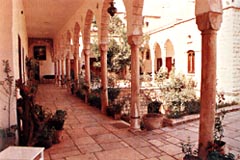|
Zahle City, Lebanon
A red-roofed town set among
the eastern foothills of Mount Sannine, Zahle enjoys a prime location in the
Beqaa valley. Snowcapped mountains tower above it in winter, while in summer its
945 meter elevation keeps the air light and dry.
The city center spreads
along both banks of the Berdawni River, with the older section of the upper
elevations of the west bank. At the northern end of town is the Bardouni river
valley known as Wadi el-Aarayesh (Grape Vine Valley) - the site of Zahle’s
famous outdoor restaurants.
Zahle styles itself “The
city of Wine and poetry”, and with good reason. In this century alone some 50
poets and writers were born here and almost as many excellent wines and araks
have been produced in the area.
The romance of wine and
poetry is balanced by Zahle’s more business like position as the administrative
and commercial capital of the Beqaa valley (42.27% of Lebanon’s territory) as
well as its rank as the country’s third largest city (population 150,000). Zahle
is also an agricultural town which produces vegetables, fruit, grains and most
importantly, grapes.
 |
|
Tucked
away from Lebanon’s busy coastal centers, the people of Zahle have developed
their own brand of individualism and way of doing things. Even their spoken
Arabic has a particular flair. The city’s reputation for intellectual vigor
comes from a long line of writers, thinkers and poets who have contributed
to Lebanon’s cultural and political scene. |
Zahle in
History
Zahle was founded about 300
years ago in an area whose past reaches back some five millennia. In the early
18th century the new town was divided into three separate quarters, each of
which had its own governor.
The city
enjoyed a brief period as the region’s first independent state in the 19th
century when it had its own flag and anthem.
Zahle was
burned in 1777 and 1791, and it was burned and plundered in 1860. But during the
rule of the Mutasarrifiah, Zahle began to regain its prosperity. The railroad
line which came through in 1885 improved commerce and town became the internal
“port” of the Beqaa and Syria. It was also the center of agriculture and trade
between Beirut and Damascus, Mosul, and Baghdad.
Considered the
birthplace of the Lebanese army, Zahle has played a major role in the political
life of the country.
Zahle Berdawni Restaurants
The
Bardouni is a river that flows out of Mt. Sannine and down through Zahle. It
is also a name synonymous with Lebanon’s famous mezze and the delights of
outdoor dining.
The
Bardouni restaurant tradition began over a hundred years ago with a few simple
riverside cafes. Today it is a virtual bazaar of tree-shaded eating places known
as “casinos”, every one more inviting than the next. Not surprisingly,
competition is fierce, so each establishment outdoes itself with fountains,
pools, and cooling shade to tempt potential customers.
Here you
can enjoy the traditional Lebanese mezze as it is served nowhere else. To add to
the sense of timelessness, delicious mountain bread is baked before your eyes
and a man in baggy trousers and fez is on hand to pour Lebanese coffee. He can
also provide diners with a hubble-bubble (water pipe).
On the
cliffs above the Bardouni are the restaurants of Kaa el Reem, also known for
their excellent food and atmosphere.
Wine And Arak
Zahle’s
association with the grape is pervasive, for it lies at the heart of an area
that has been making wine since early antiquity. At the city’s southern
entrance the statue of a graceful female personifies wine and poetry, but you
don’t have to look far to see evidence of the real thing. The hills north of
town with names like Wadi Hadi, Harqat, Bir Ghazour and Tell Zeina are covered
with the neat rows of vineyards that supply Zahle’s wine and arak industries. Many of the
wines have been formally recognized abroad for their fine quality - equal to
some of the best in Europe.
A tour of
Zahle’s Ksara winery is a good way to see how wine and arak are made. Of special
interest here are the extensive underground caves built around a natural grotto
known and enlarged by the Romans.
more>>
Information From the Ministry of
Tourism

|